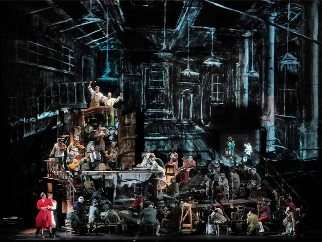|
Back
Langsam, Wozzeck, Langsam New York
Metropolitan Opera House
12/27/2019 - & January 2, 7, 11, 16, 19, 2020
Alban Berg: Wozzeck, opus 7
Peter Mattei (Wozzeck), Gerhard Siegel (Captain), Andrew Staples (Andres), Elza van den Heever (Marie), Tamara Mumford (Margret), Christian Van Horn (Doctor), Christopher Ventris (Drum Major), Brenton Ryan (Fool), David Crawford, Miles Mykkanen (Apprentices), Daniel Clark Smith (Soldier), Gregory Warren (Townsman), Eliot Flowers (Child), Andrea Fabi, Gwyneth E. Larsen (puppeteers), Frank Colardo, Tina Mitchell (actors)
Metropolitan Opera Chorus, Donald Palumbo (chorus master), Metropolitan Opera Chilren’s Chorus, Anthony Piccolo (director), Metropolitan Opera Orchestra, Yannick Nézet-Séguin (music director and conductor)
William Kentridge (production), Luc De Wit (co-director), Catherine Meyburgh (projection designer), Sabine Theunissen (set designer), Greta Goiris (costume designer), Urs Schönebaum (lighting designer)

(© Ken Howard)
“Just as Büchner had written the first modern play, Berg had written the first modern opera.”
Karen Monson, Alban Berg
Much has changed since I first saw Wozzeck at the old Metropolitan Opera house in the early 1960’s. At that time there were two intermissions (as Berg intended) and a lot of grumbling during these intervals about the work in question (this has quieted down considerably since then). At Lincoln Center the rest periods have vanished and so we now have – for better or worse – a rather short night. Add to this a new music director – who, like Maestro Levine, has taken the baton himself – and it all seems novel and different. How does this performance stack up against previous ones?
Pretty well, although a different approach. This is a busy effort with much happening throughout the hour and twenty minutes. The conceit is that there is a film being shot and the ancient cameras evoking the silent era (as well as Berg’s other opera Lulu which employs a filmstrip to great dramatic effect) are everywhere. This device adds to the surrealism of the tale, the characters not really alive but rather representational cut-outs of a military story. Under this canopy the singers and actors play out their tragedy in a somewhat zombie-like manner, a perfect visual representation of Berg and Büchner’s mysterious and surrealistic nightmare (Berg was himself washed out of the army during the early stages of the Great War).
Most of the singers did a fine job, notably Peter Mattei and a somewhat under-voiced Christopher Ventris. The music as a whole was well-served, except that the orchestra was not having its best performance. The trumpets in particular were weak, slurring the first note of many of their bugle calls, thus undercutting the military mood. Maestro Nézet-Séguin kept the ensemble in check, although I would have wished for a little more emotion. The interlude right before the last scene was very powerful and the conductor resisted the impulse to grow the famous crescendo to a place too loud to be within the bounds of proper intonation and dramatic effect. Mysteriously (and unforgivably) there was no piano on stage for the tavern scene, thus undercutting the most dramatic passage in the entire opera, when Margret takes center stage and the fool intones the horrifying “I smell blood!” It was as if the director and/or the maestro had purposefully undercut the spine-tingling of the moment. If this is so, then it is unforgiveable.
Although others were impressed, I was especially disappointed by the Marie of Elza van den Heever, who seemed somewhat uncomfortable in the role. Perhaps it was simply opening night jitters – let us hope so. Overall this was a good effort, but not in the class of either maestro Levine or (back in the Pleistocene era and my own childhood) Karl Böhm.
Fred Kirshnit
|